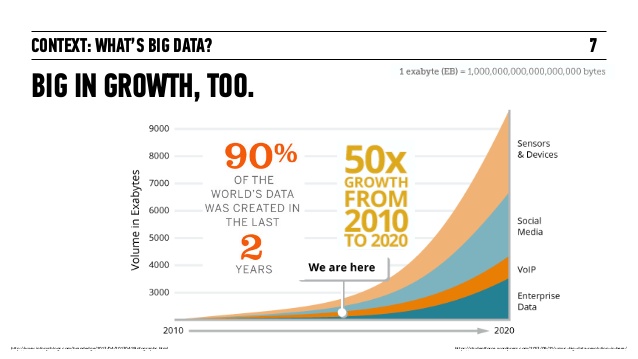Big Data has come a long way – from its inception in the internet search companies (who found processing of very large loosely structured datasets as a challenging task) to widespread adoption in enterprises. In 2016, it was reported that 76% of all organizations are planning to increase or maintain their investment in big data over the next two to three years. Today, when we say Big Data, it primarily means the process of performing analyses on very large data sets (read exabytes) via computers with higher processing capability to unveil insights that might not be normally visible.
Now we’ve entered an era in which Big Data is not considered as a buzzword; it has already started delivering value to those enterprises who adopted the right implementation strategy. Assuming that a company has right tools, techniques and talent, Big Data (both structured and unstructured) will be able to enrich analytics capabilities to provide better insights (even in terms of future demand of customers) and reveal hidden patterns.
Why Web Data
There is no doubt that the benefits that Big Data offers look quite appealing, but we must consider that a solid enterprise data strategy should be in place to manage the complete inventory of data. If your Big Data strategy is only focused on the data generated from day-to-day transaction done with customers, then you’re missing out on web data generated outside of your organisation. This leads to incomplete data sets for your enterprise analytics platform and eventually results in competitive disadvantage. This is because of the fact that without wider data sets, the insights you gain to drive business won’t be as accurate as the insights from data sets that have the right mix of both external and internal data.
Bolstering Data Assets
You can use the available enterprise data up to a certain extent; once you reach the threshold there only two options left–finding additional sources of data in your organisation that can be digitised and extracting readily available web data. While both the options are viable, there later option can save time, free up resources and add better value. If you choose the first option, then you’ll have to gain access to data assets that your company collects and stores during everyday operations, but doesn’t use it for any other purpose or processing. Few examples could be the paper-based customer information that your organisation stores, meeting notes, physical mails, etc. However, there are some intrinsic challenges associated with such type of data. Here are the salient points:
- Aggregating data
- Relating and tagging data for enrichment
- Generating Insights
- Implementing in business processes
The basic premise of accessing this data must be that it has to be different from the already available digital data. The second option – aggregating external web data can have much more impact without heavy investment in resources. There is a high probability that, for your vertical, there would be a vast amount of publicly available data on the web. For example, a competitive analysis can be done by getting data from competitor’s website, compliance and monitoring via partners’ and resellers’ website, opinion mining can be done using data from media portals and consumer forums. Extracting and applying them to your business requires right tools and techniques. Finally, this leads to an analytics approach, which caters to a holistic view of the business.
Insight Mining
The insights resulting from Big Data can help enterprises surpass competitors and put them in a growth trajectory. The distinct competitive advantage of mining insights from the data available on the web includes better pricing strategy, robust demand estimation, solid reputation management, accurate product strategy and much more. At this time, smaller businesses can also leverage the benefits of web data by leveraging cloud-based platforms that can put them on the same ground as that of large enterprises. And they need not develop the resource intensive Big Data infrastructure on their own. One more advantage of the cloud-based data platforms is that, according to the growth of the business, companies can scale the usage of the platforms. PromptCloud’s web data extraction platform takes away the pain of managing and setting up Big Data infrastructure along with maintenance and talent cost. Big data acquired from the web can be leveraged to achieve numerous objectives of an organisation. Augmenting internal data with web data helps in creation of robust data assets and provides competitive advantage. At the same time, deployment of scalable and cloud-based web data extraction platform reduces the total cost of ownership.




















